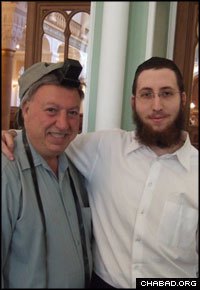The stories of hundreds of rabbinical students currently traveling the world are pouring in, and while the participants of the Chabad-Lubavitch Rabbinical Summer Visitation Program are in locations as diverse as Guam and Russia, they all have one thing in common: their love of the Jewish people, wherever they may be found.
Their first-hand accounts can be viewed on RovingRabbis.com and a blog hosted by the popular Jewish Web site, Chabad.org.
For communities without full-time rabbis, synagogues or Jewish community centers, such as North and South Dakota, the Balkans and Guam, the visitors – whose trips are coordinated by Merkos L’Inyonei Chinuch, the educational arm of Chabad-Lubavitch – deliver much-needed inspiration to local Jewish residents, and transient Jewish professionals and tourists. In other communities, the rabbinical students’ presence provides added staffing for summer camps, nursing home programs and one-on-one learning opportunities for neighbors.
In the majority of cases – as has been a trademark of the visitation program since its founding 65 years ago at the behest of the Rebbe, Rabbi Menachem M. Schneerson, of righteous memory – the young rabbis’ traipse from small town to small town, knocking on doors and visiting offices all in the search for Jewish life where it’s hard to find. They proffer the opportunity to do a mitzvah, such as hanging a mezuzah on a person’s door or donning tefillin, or just to schmooze with fellow Jews.
In Bahia, Brazil, Moshe Loebenstein is going up and down the coastal region in the search for Jewish residents and tourists. So far, he and his partner have talked with elderly Holocaust survivors and offered encouragement to an Israeli expatriate living in the capital city of Salvador.
Over on America’s West Coast, Chaim Litvin says that he’s bringing a sense of belonging to the Jewish people he encounters in Riverside, Calif.
“I realize how fortunate I have been, and I strive to bring as much as much as I can to the people to fill their void,” he explains.
All Around the World

Cities in Italy, Cyprus, Southeast Asia and Peru all have teams of students to greet the droves of tourists arriving during peak travel season. There’s even a team on hand to assist the full-time Chabad-Lubavitch emissaries in Beijing reach out to the Jewish athletes and fans in town for the summer Olympics.
Reporting from the Caribbean island of S. Lucia, Laima Barber notes that for many people they meet, he and his teammate first religious Jew they’ve meet.
“We get lots of curious people asking what brought us down,” he says. “It’s impossible not to feel like we’re the tourist attraction and people came here to see us!”
Other stories on the Roving Rabbis Web site tell of a group of students stormed in for the night who meet a Jewish motel clerk in Arizona, and a man who upon seeing two young rabbis traveling to China decides to don tefillin with them and proudly wear a skullcap for the remainder of the flight.
“We can always tell that there’s something greater at work here,” says Chanan Maister, a regular contributor to the blog who is currently in Litchfield, Conn. “A friend in Huntsville, Ala., called me asking for some advice about finding Jewish people. A while later we met someone in Connecticut who mentioned that he has a brother with no Jewish connection living in Huntsville.”
“These itinerant young men are the ‘Jewish Peace Corps,’ going where they’re needed most,” says Rabbi Moshe Kotlarsky, vice chairman of Merkos L’Inyonei Chinuch. “They travel about in different regions scouting for Jewish people with a contact list and a few leads. By summer’s end, they will have touched many more people.”
To help the travelers with their goal, the Roving Rabbis site has a feature where users can click on a world map and send an e-mail to the rabbinical students at that location, says site editor Rabbi Menachem Posner. “We put the readers in touch with the rabbis if they know of someone who would appreciate a visit.”
The rabbis also utilize every means available to get word out of their arrival, including the local media.
In Guam, David Loksen and Shmulie Hecht caught the attention of ‘The Big Show,’ a local radio talk show. Travis Coffman, the show’s host, had the pair come to the studio, where Loksen explained what brought them to the tiny Pacific island and sang a Yiddish melody before fielding questions from callers.
But finding Jews isn’t always as easy as announcing your arrival, reports Maister. In previously uncharted country, a little creativity is needed for finding the most disconnected Jews.
“There’ll be those days when we pull out the white pages and start cold-calling all the Goldsteins, Bergs and Fines,” he reveals. “There’s a lot of hang-ups, but sometimes your call comes at just the right time, and people invite you to drop by.
“Those meetings are the most gratifying,” he adds. “You’ve given someone a brand new relationship with Judaism.”





Join the Discussion